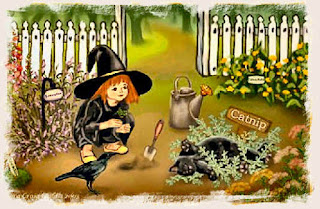 |
| Illustration from Pooka Pages |
These are questions that the Pagan community struggles with as we raise our children in the highest numbers since Gardner published Witchcraft Today in 1954.
We are so used to seeing the effects of religious belief being framed in Christian terms. That is the world we live in.
But what does pure religious belief have to offer our kids? There are studies (here, here, here, and here) that indicate that sharing religious beliefs, activities and experiences can strengthen a family's relationships to each other. There is often more connection and communication.
 |
| Children standing with The Lady of Cornwall in a neopagan ceremony in England. |
Healthy spiritual beliefs may improve health, both physical and psychological. Religion provides a way to express the innate need to find purpose and reason in the natural world, and a way to express our beliefs in a supernatural world.
Some ways that teaching religion does NOT support healthy religious beliefs include:
- punishment for not adhering to religious behaviors
- teaching by rote memorization rather than engaging with stories and games
- negative reactions to questioning the religious teachings – this can include refusal to answer or refusal to consider alternatives
- using fear as a way to reinforce belief – ie, if you don’t believe, you’ll go to hell
Leaving kids the choice is an issue that I hear a lot of. So I ask, how does allowing your children to religiously identify the same way that their mom and dad do, close the door to them asking about other religions? Or prevent them from later changing their mind?
 |
| From Raising Pagan Children |
If we want our children to feel like a complete part of our families, we need to include them in our religious experiences. We can do this by talking to our kids about our beliefs, about the rituals that we practice, and about the gods and spirits that we interact with in our lives.
I will leave you with a quote from an article from UU World: “Sharing personal religious and spiritual beliefs with children is not indoctrination; it is offering the guidance they eagerly seek until they are developmentally ready to decide for themselves. If children receive vague and confusing answers time and again when they ask about spiritual and theological issues, they’ll eventually stop asking and start looking for answers elsewhere. But many of the other people your children may encounter in life will not be so hesitant to pass on their religious beliefs, opening up the possibility that the vacuum you’ve left will be filled by others who are seeking to indoctrinate them.”

No comments:
Post a Comment